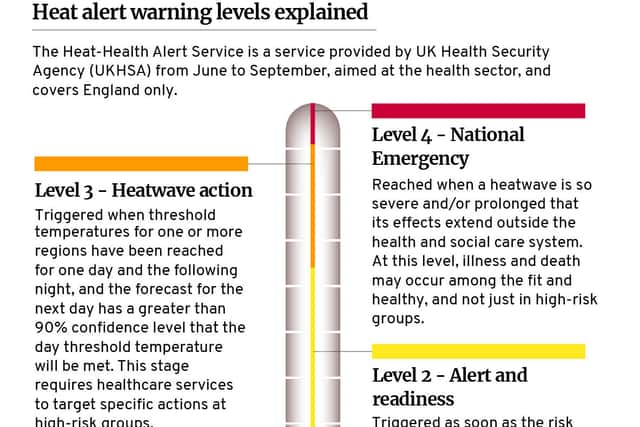When will the UK heatwave end? How long hot weather will last - and Met Office Level 4 heat warning explained
and live on Freeview channel 276
Temperatures are continuing to soar across the UK as a heatwave continues.
Advertisement
Hide AdAdvertisement
Hide AdIt is in place for Monday (18 July) and Tuesday (19 July) and temperatures could exceed 40C for the first time.
But almost as quickly as the warm weather arrived, Brits have complained of it being too hot.
It’s uncomfortably mild for many, so just when can we expect temperatures to ebb again?
Here’s everything you need to know.
What heatwave warnings are in place?
An amber weather warning for extreme heat is in place for much of England and Wales for Sunday, Monday and Tuesday (17 July to 19 July).
Advertisement
Hide AdAdvertisement
Hide AdA “extreme” red warning is now in place for parts of central, northern, eastern and southeastern England on Monday and Tuesday.
The Met Office issued the new warning for the first time ever, amid fears temperatures could pass 40C in places,
The two heat warning are being enforced across the East Midlands, east of England, London, South East, North East, North West, South West, Wales, West Midlands, Yorkshire and Humber, Cornwall, west Wales and parts of southern Scotland.


When will the heatwave end?
The Met Office says that after Tuesday, temperatures are expected to start to return closer to normal for the time of year as cooler air pushes across the country from the west.
Advertisement
Hide AdAdvertisement
Hide AdClimate attribution scientist at the Met Office, Dr Nikos Christidis, said: “We hoped we wouldn’t get to this situation but for the first time ever we are forecasting greater than 40°C in the UK.
“In a recent study we found that the likelihood of extremely hot days in the UK has been increasing and will continue to do so during the course of the century, with the most extreme temperatures expected to be observed in the southeast of England.
“Climate change has already influenced the likelihood of temperature extremes in the UK. The chances of seeing 40°C days in the UK could be as much as 10 times more likely in the current climate than under a natural climate unaffected by human influence.
“The likelihood of exceeding 40°C anywhere in the UK in a given year has also been rapidly increasing, and, even with current pledges on emissions reductions, such extremes could be taking place every 15 years in the climate of 2100.”
What disruption could the heatwave cause?
Advertisement
Hide AdAdvertisement
Hide AdThe Met Office has warned the extreme heat could cause serious illness and danger to life while road closures are possible alongside cancellations to train and air travel.
Network Rail has warned speed restrictions are likely to be in place this week on some parts of the network most affected by the hot weather.
Fire services have urged people to have picnics instead of barbecues during the warm weather after a spate of grass fires.
And the AA Driving School and RAC said motorists should carry water with them, start their journeys earlier in the day, plan their routes and check their vehicles before setting off.
How to keep cool
Advertisement
Hide AdAdvertisement
Hide AdWith such extreme temperatures, it’s important to look after your wellbeing – making sure you are drinking enough water and not spending too much time in the sun.
It is important to stay hydrated during a heatwave, particularly as you might be losing more fluids than normal due to sweat.
Downing Street has said that “significant work” is being done within Whitehall to ensure the most vulnerable are protected during the heatwave.
The Prime Minister’s official spokesman said Cabinet Office Minister Kit Malthouse briefed ministers on the preparations at the weekly meeting of the Cabinet on Tuesday 12 July.
Advertisement
Hide AdAdvertisement
Hide AdThe spokesman said that planning had been taking place within the NHS and with local councils as well as across transport networks.
“Officials have met to discuss and coordinate the response. We continue to monitor the results of the heatwave,” the spokesman said.
“There is significant work going on across the government in making sure those who are most vulnerable to high temperatures are looked after and given the requisite advice.”
Comment Guidelines
National World encourages reader discussion on our stories. User feedback, insights and back-and-forth exchanges add a rich layer of context to reporting. Please review our Community Guidelines before commenting.
